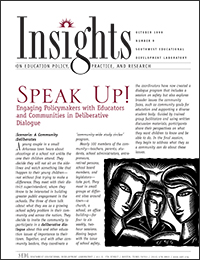Understanding Community Concerns and Needs
Some school leaders will recognize their own sentiments in the words of one local superintendent who agreed to be interviewed by SEDL. Asked why she participated in a community-wide study circle program in Arkansas, she said, “To be effective, we need to listen to the patrons of the school district. . . . We are all in this together. I need to know if [the parents and community members] have concerns I and other administrators are not addressing.”
Policymakers need exposure to diverse perspectives. Some policymakers rely solely on their own instincts to determine the needs and concerns of constituents. Many, however, like the superintendent above, appreciate the chance to sit down face-to-face with a diverse group of their fellow community members to hear what is on their minds. These policymakers are frequently surprised to see that issues raised by some community members in dialogues differ from those the policymakers anticipated. For example, a school board member making decisions about whether to emphasize job skills over the “basics” in schools may not previously have considered the perspective of a member of the business community who tells her he values literacy in a job applicant above job skills that he can teach his employees himself.

Members of the public welcome opportunities to share openly with each other and their policymakers. Most members of the public seldom have the opportunity to sit down with policymakers and other community members as equals at a table and talk about their opinions on an issue. Deliberative dialogue participants say that dialogue in small groups, in an informal setting, and for a prolonged period of time allows them to really get to know each other and feel comfortable sharing thoughts with each other. The door is opened for them to share frankly and say, “What can we do about this? How can we do a better job for our young people?” Community participants in deliberative dialogues particularly value the experience as a departure from the usual one-way interaction with policymakers, in which the policymaker addresses the public and presents his or her position on an issue.
When education leaders become aware of public concerns, they can examine and adjust ideas and policies in light of these concerns. As community members see their opinions valued, they may be more receptive to new policies. Deliberative dialogue provides a vehicle for all stakeholders in education to hear what their neighbors are thinking in a civil, constructive atmosphere.
Next Page: Gaining Support for Education

